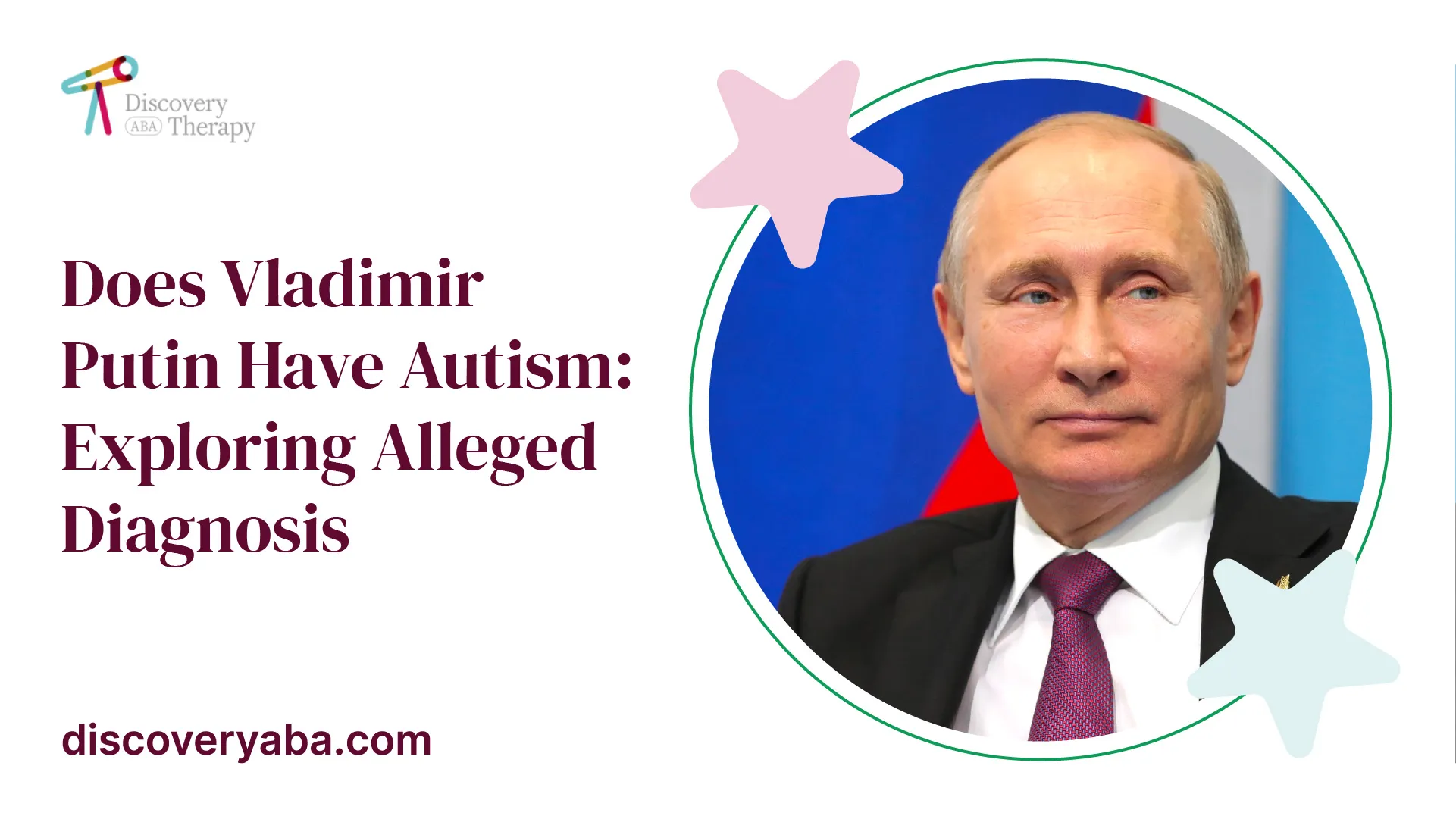Does Vladimir Putin Have Autism: Exploring Alleged Diagnosis
Delve into the Autism Debate Surrounding Vladimir Putin's Alleged Diagnosis. Separate Fact from Fiction and Explore the Evidence.

Understanding Autism Spectrum Disorder
To explore the alleged diagnosis of autism in Vladimir Putin, it is important to first understand Autism Spectrum Disorder (ASD) itself.
What is Autism?
Autism is a neurodevelopmental disorder that affects individuals across a wide range of abilities and experiences. It is characterized by challenges in social interaction, communication, and repetitive behaviors. As a lifelong condition, autism can manifest differently in each person.

Characteristics of Autism
Individuals with autism may exhibit various characteristics that are associated with the disorder. These can include difficulties with social interaction, communication, repetitive behaviors, hypersensitivity to sensory input, and challenges with transitions or changes in routine. However, it is important to note that the severity and manifestation of symptoms can vary widely between individuals.
Understanding the nature of autism is crucial in considering the alleged diagnosis of any individual, including public figures like Vladimir Putin. It is important to rely on credible sources and professional assessments to evaluate the presence of autism in an individual accurately.
Speculations about Vladimir Putin
Speculations surrounding the neurodivergence of prominent figures often arise, and Vladimir Putin is no exception. However, it's important to note that these speculations are not substantiated by any official diagnosis or credible evidence. The topic of Putin's neurodivergence, particularly autism, is highly debated, with contrasting opinions and viewpoints within the autism community.
Rumors and Speculations
Rumors regarding Vladimir Putin's potential autism diagnosis have circulated, but their origin can be traced back to a book written by Brenda Connors, who is not a medical professional. It's essential to approach these rumors with caution and recognize the lack of concrete evidence supporting them.
Lack of Official Diagnosis
It is important to emphasize that there is no official diagnosis of autism for Vladimir Putin. The absence of an official diagnosis means that any claims regarding his neurodivergence are merely speculative and should be treated as such. It is crucial to rely on credible sources and expert opinions when discussing the potential diagnosis of public figures.
Speculating about someone's neurodivergence, particularly autism, without concrete evidence can have both positive and negative effects. On one hand, if confirmed, it could increase awareness and acceptance of autism. On the other hand, it can perpetuate harmful stereotypes and misconceptions when based solely on speculation. Therefore, it is crucial to approach such discussions with sensitivity and rely on reliable information from medical professionals.
While the topic of Vladimir Putin's potential autism diagnosis may pique curiosity, it is important to remember that without an official diagnosis or credible evidence, any assertions should be regarded as speculative and not as definitive conclusions.
Autism and Public Figures
When it comes to discussing the potential autism diagnosis of public figures like Vladimir Putin, there are significant challenges and ethical considerations involved. Diagnosing autism from a distance is widely regarded as both impractical and unethical within the field of psychiatry.
Challenges of Diagnosing from a Distance
Experts, including Professor of Psychiatry Dr. Simon Baron-Cohen, emphasize that it is impossible to accurately diagnose autism or any other mental health condition without a comprehensive, in-person assessment. Autism is a complex neurodevelopmental disorder that requires a thorough evaluation conducted by trained professionals.
Remote speculation about a public figure's mental health, such as Vladimir Putin, lacks the necessary information and context required for an accurate diagnosis. Without direct observation and proper assessment, it is impossible to make a reliable determination of autism or any other psychiatric condition.
Ethical Considerations
Diagnosing someone with autism or any mental health condition from a distance is considered unethical. Dr. Scott Lilienfeld, a Professor of Psychology at Emory University, emphasizes that media reports and remote speculation cannot substitute for a comprehensive evaluation. Making unsupported claims about an individual's mental health can perpetuate stereotypes and stigma surrounding autism.
It is essential to respect the privacy and dignity of public figures when discussing their mental health. Speculating about a person's autism diagnosis without proper assessment is not only invalid but also potentially harmful. Mental health conditions should be approached with sensitivity, empathy, and adherence to ethical guidelines.
In conclusion, diagnosing someone with autism, including public figures like Vladimir Putin, from a distance is both challenging and ethically problematic. Without a comprehensive, in-person assessment conducted by qualified professionals, it is impossible to make accurate determinations about an individual's mental health. Respect for privacy and adherence to ethical considerations are crucial when discussing the potential autism diagnosis of public figures.
Autism Awareness and Acceptance
Speculations about whether Vladimir Putin has autism have sparked discussions and debates within the autism community and the general public. While these speculations are not substantiated by any official diagnosis or credible evidence, they have both positive and negative effects on the autism community.
Positive Effects of Speculations
One potential positive effect of the speculations is that they can increase awareness and acceptance of autism. When public figures are speculated to be on the autism spectrum, it can shed light on the diversity of individuals with autism and challenge societal stereotypes. This increased awareness may lead to a greater understanding and acceptance of neurodivergent individuals, ultimately fostering a more inclusive society.
Additionally, the speculations surrounding Vladimir Putin have sparked conversations about autism, its characteristics, and the challenges faced by individuals on the autism spectrum. These discussions can provide an opportunity for education and dispelling misconceptions about autism, contributing to a more informed and empathetic society.
Negative Effects of Speculations
While there are potential positive effects, it is important to recognize the negative consequences that speculations can have on the autism community. Speculating about someone's neurodivergence, especially without concrete evidence, can perpetuate harmful stereotypes and misconceptions.
Assigning a diagnosis without proper assessment and confirmation can trivialize the experiences of individuals with autism who have undergone a comprehensive assessment process. It is crucial to rely on accurate information and avoid making assumptions based solely on speculation.
Furthermore, linking someone's behavior or characteristics to a diagnosis without proper evidence can lead to misunderstandings and generalizations. Each individual with autism is unique, and assumptions based on speculation can oversimplify the complexity of autism spectrum disorder.
In conclusion, speculations about Vladimir Putin's potential autism diagnosis have both positive and negative effects on the autism community. While they can increase awareness and acceptance of autism, they can also perpetuate stereotypes and misconceptions. It is important to approach discussions about autism with sensitivity, relying on accurate information and avoiding armchair diagnoses.
Importance of Accurate Diagnoses
When discussing the alleged diagnosis of autism in public figures like Vladimir Putin, it is crucial to emphasize the importance of accurate diagnoses. Speculating about someone's mental health from a distance can lead to misinformation and potential harm. To gain a proper understanding, a comprehensive assessment process is necessary, while armchair diagnoses pose significant risks.
Comprehensive Assessment Process
Accurately diagnosing autism spectrum disorder (ASD) or any mental health condition requires a comprehensive assessment process. This process involves direct observation, evaluation, and interaction with the individual under assessment. Professionals, such as psychiatrists and psychologists, utilize various standardized tools and techniques to gather information about the individual's behavior, social interactions, communication patterns, and developmental history.
During the assessment process, professionals may also consider input from family members, caregivers, and other relevant individuals who have firsthand knowledge of the person's behavior and development. The comprehensive assessment process allows for a holistic understanding of the individual's strengths, challenges, and specific needs.
Risks of Armchair Diagnoses
Armchair diagnoses, or diagnosing someone without proper assessment or direct observation, pose significant risks in the field of mental health. It is impossible to accurately diagnose autism or any other mental health condition from a distance. Speculating on an individual's mental health without proper qualifications, knowledge, or access to relevant information can lead to misinformation, stigmatization, and misunderstandings.
Armchair diagnoses of public figures, such as Vladimir Putin, are particularly problematic. Speculations based on limited information or media reports can perpetuate stereotypes, create unfounded associations, and contribute to the negative perception of individuals with autism or any mental health conditions. It is essential to approach discussions surrounding mental health with caution, respect, and adherence to ethical guidelines.
In conclusion, accurate diagnoses play a crucial role in understanding and addressing mental health conditions such as autism. The comprehensive assessment process, conducted by qualified professionals, provides a comprehensive understanding of an individual's strengths and challenges. On the other hand, armchair diagnoses present significant risks, including misinformation and stigmatization. It is important to rely on accurate assessments and avoid speculations when discussing the mental health of public figures or any individual.
References
Does Your Child Have An Autism Diagnosis?
Learn More About How ABA Therapy Can Help
Find More Articles
Contact us
North Carolina, Nevada, Utah, Virginia
New Hampshire, Maine
Arizona, Colorado, Georgia, New Mexico, Oklahoma, Texas
.avif)




































































































